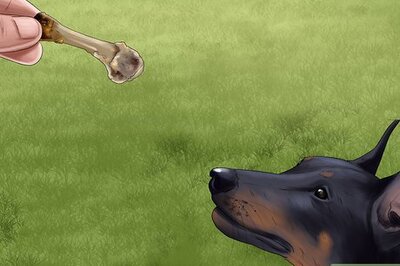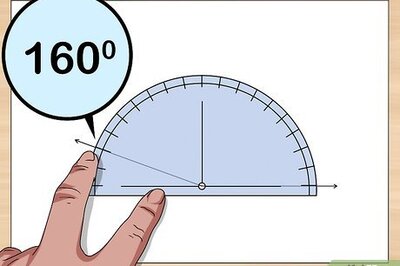
views
Veteran quiz master and Trinamool Congress Rajya Sabha member Derek O'Brien recently delivered a lecture at Ivy League Yale University on West Bengal Chief Minister Mamata Banerjee's ascent to power, her struggling years and what he terms as the people's movement to oust a Communist government that ruled the state for over three decades.
IBNLive:The communists had been in power in West Bengal for decades. How did your party take on a strong cadre-based party? What were the key elements of your party’s strategy in combating the Left in Bengal?
Derek: There was no quick answer. It happened over a long period. It took a series of movements to take on the communists (including a 26-day hunger strike!) The strength was that they were people's movements. It had to be down upwards not top downwards. You've read about the Nandigram and Singur movements but they were not the only ones. There were many such movements. Yes, people’s movements were the key.
IBNLive:With respect to future alliances and the 2014 general elections, how wedded is your party to the UPA? Trinamool has been a coalition partner of the BJP in the past. Would you consider joining hands with them in 2014? Is that foreseeable?
Derek: I do not think this would be appropriate for me to discuss nor am I qualified to discuss Trinamool's strategy sitting here on a New Haven campus in Connecticut. But having said that, we are a dependable ally of the UPA. We have been elected to govern from 2009 to 2014 and that is our job now in Delhi and our job in Bengal from 2011 to 2016 is to govern and that is our focus.
IBNLive:Several commentators have said the Trinamool's victory in the 2011 Assembly elections was a 'self goal' by the Left. Do you agree or is it taking credit away from your party and its strategy?
Derek: The people of Bengal spoke loud and clear and to call this a self goal is an insult to them. The bottomline is in a democracy votes are cast and votes are counted and seats work out that way. People are the best judge.
IBNLive:As the UPA's largest alliance partner, what are your priorities? How important are issues such as passage of the new land acquisition bill and managing price rise?
Derek: In whatever we do we have three priorities. Our first priority is the people, our second is the people and our third is the people. So we never lose focus and whatever we do is people centric.
We can say with a sense of pride that the land acquisition bill is in its present form thanks to movements that happened in Bengal under the leadership of Mamata Banerjee. The bill got there largely because of Trinamool's view on land acquisition.
Our view is very clear: no private acquisition of land. Among all the political parties in India, and let me say this with some conviction, we have been the most consistent in our view on land acquisition. In fact it wasn't a surprise when the Union rural development minister, at the press conference after the bill was tabled, publicly thanked the general secretary of his party and Mamata Banerjee for their efforts in getting the bill where it is today.
IBNLive:Given the strong grassroot presence of the Trinamool in Bengal, how accurate is it to call the party a 'one-woman army'?
Derek: Good question. When I shared the subject of this lecture with my leader, she also in all humility told me that 'Derek, this is more than a one-woman army: we are all in this together and we've all been working on this together.' But her humility apart, the reality is you need a persona, a larger than life person to bind this all together. So she is very much the binding and guiding force.
IBNLive:How do you see the demands for a separate state of Gorkhaland? Where are negotiations with the Gorkha Janmukti Morcha headed?
Derek: This question is beautifully timed, because less than 24 hours ago, the chief minister had a wonderful visit to north Bengal where she made some very interesting points about the development of the region. Everything was possible to do there from development to education to tourism and she pointed out that all this possible but Darjeeling will always be a part of Bengal. So she has made a straightforward statement.
IBNLive: For the people of Bengal and elsewhere, Trinamool means Mamata Banerjee. There seem to be succession issues in other political parties but how do you and your party see the future of Trinamool? What after Mamata?
Derek: That's a tough one. I think when you have a leader of this stature the question of succession doesn't arise. However, she is a democratically elected leader of the party. In fact, on November 2 we'll be holding elections again for the chairperson and the state president.
And this is a question that can be asked to so many other parties. But I think what Mamatadi has the ability to do is to attract talent. And I must assure you that there is a lot of talent. To be fair a lot of people underestimate this talent and that is actually our strength.
IBNLive: It is not common to have someone called "Derek O’Brien" in Indian politics? Tell us the story behind your name?
Derek: My great-grandfather was Irish. He was from Cork. He married a Bengali lady, hence the name.
IBNLive: Can you tell us about your transition from advertising to quizzing to politics? How did this happen? And why did you decide to join politics?
Derek: The common thread that binds these three is ideas and communication. For me politics is happening and quizzing is also happening. The transition happened because one thing about politics is that one can talk about it at parties and social functions or one can get in and do something about it. Let me ask you a question. How many of you were born before 1977? I was 16 when the communists came to power, it was when (Bjorn) Borg won Wimbledon with a wooden racket. That's how long back they came into power. They had infiltrated everyone's life starting from education to employment to health. One wanted to play a part in removing them.
IBNLive: What are your personal ambitions in politics? You are now a Rajya Sabha MP from West Bengal and on the HRD and Health Standing Committees. What has been your experience so far and where do you want to go with politics?
Derek: To use a term you are familiar with I am a freshman in Parliament. Maybe I can answer this question better when I become a sophomore. There is a great amount of talent in Indian Parliament, make no mistake about it. But it is sad that the two-three per cent of people who misbehave get highlighted by the media. But I quickly learnt in Parliament that it is very important to do your research and understand your subjects, the level of debates is extremely high. I'll give you two cases. One was in the removal of a judge and even on the Lok Pal. The media needs to focus on the 97 per cent that get into serious debate but I can understand that the other stuff makes better television and better 'masala'. I have understood that is much more difficult to debate in Paliament than to give a quick bite in front of the television.
IBNLive:In recent times, politicians and even civil society activists have relied on Media, particularly social media such as Twitter and Facebook, to reach out to people. As someone who is active on Twitter, how important do you think it is for political parties and persons in public life to utilise these tools? What are the advantages and more importantly, what are the challenges and limitations to this?
Derek: There is no substitute for mass contact and ground contact with the people but in an age of 360 degree communication there would be all these different tools which are available. I don't think it's A and B, you need to take everything into consideration. But the future really is, besides ground contact, which has no substitute, when these social media channels get into regional languages then they will have a larger role to play.
IBNLive:Your party, the Trinamool Congress represents a growing importance of regional parties in India. In this context, what are your views on where coalition politics in India is headed? How do you see the relationship between regional parties in some states and the big national parties such as the Congress and the BJP?
Derek: Federalism is an evolving process and in this evolution states are being represented in a better way. In a way Parliament is becoming an aggregate of state elections, which is a good thing. In this trend regional parties will have a say and who knows some years down the line, they might have a bigger role than that. Regional parties are important for understanding the needs and aspirations of the state.




















Comments
0 comment